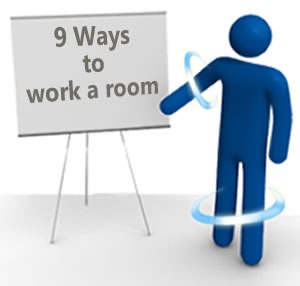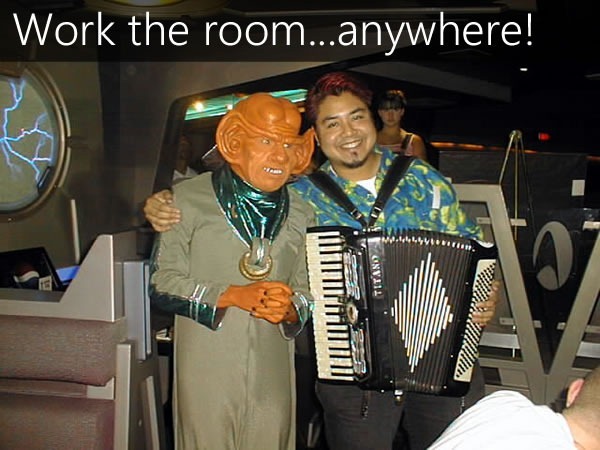Why Work the Room?
If you’re attending TechDays in Vancouver, Mobile Innovation Week in Toronto, or any other conference anywhere else, you should keep in mind that while we spend a lot of energy on the presentations and sessions, the opportunity to meet and talk to the other people there is just as important. I’ve observed that some of the most important things I’ve learned at conferences didn’t happen at the presentation, but in the hallways, conversing with the other attendees. This observation is so common that it’s given rise to “unconferences” like BarCamp, whose purpose is to invert the order of things so that the conference is more “hallway” than “lecture theatre”.
It’s especially important to talk to people you don’t know or who are outside your usual circle. Books like The Tipping Point classify acquaintances with such people as “weak ties”, but don’t let the word “weak” make you think they’re unimportant. As people outside your usual circle, they have access to a lot of information that you don’t. That’s why most people get jobs through someone they know, and of those cases, most of the references came from a weak tie. The sorts of opportunities that come about because of this sort of relationship led sociologist Mark Granovetter to coin the phrase “the strength of weak ties”.
The best way to make weak ties at a conference is to work the room. If the phrase sounds like sleazy marketing-speak and fills your head with images of popped collars and wearing too much body spray, relax. Working the room means being an active participant in a social event and contributing to it so that it’s better for both you and everyone else. Think of it as good social citizenship.
9 Ways to Work the Room
 Here are some bits of advice for working the room at TechDays, culled from a mix of Susan RoAne’s advice in her books How to Work a Room and Face to Face: How to Reclaim the Personal Touch in a Digital World, Larry Chiang’s article in GigaOm on the topic and my own experiences working the room (which in turn led me to this job and is why you’re reading this blog entry).
Here are some bits of advice for working the room at TechDays, culled from a mix of Susan RoAne’s advice in her books How to Work a Room and Face to Face: How to Reclaim the Personal Touch in a Digital World, Larry Chiang’s article in GigaOm on the topic and my own experiences working the room (which in turn led me to this job and is why you’re reading this blog entry).
- Be more of a host and less of a guest. No, you don’t have to worry about scheduling and who’s running the AV rig. By “being a host”, I mean doing some of things that hosts do, such as introducing people, saying “hello” to wallflowers and generally making people feel more comfortable. Being graceful to everyone is not only good karma, but it’s a good way to promote yourself. It worked out really well for me; for example, I came to the first DemoCamp as a guest, but by the third one, I was one of the people officially hosting the event.
- Beware of “rock piles”. Rock piles are groups of people huddled together in a closed formation. It sends the signal “go away”. If you find yourself in one, try to position yourself to open up the formation.
- Beware of “hotboxing”. I’ve heard this term used in counter-culture settings, but in this case “hotboxing” means to square your shoulders front-and-center to the person you’re talking to. It’s a one-on-one version of the rock pile, and it excludes others from joining in. Once again, the cure for hotboxing is to change where you’re standing to allow more people to join in.
- Put your coat and bag down. Carrying them is a non-verbal cue that you’re about to leave. If you’re going to stay and chat, put them down. When you’re about to leave, take your coat and bag and start saying your goodbyes.
- Show and tell. We’re geeks, and nothing attracts our eyes like shiny, interesting pieces of tech and machinery. It’s why I carry my accordion around; I think of it as a device that converts curiosity into opportunity (and music as well). I’ll be doing the same with my Windows Phone 7 device as well! Got a particularly funky laptop, netbook, smartphone or new device you just got from ThinkGeek? Got a neat project that you’ve been working on? Whatever it is, park yourself someplace comfortable in the hallway, show it off and start a conversation!
- Save the email, tweets and texts for later, unless they’re important. They’ll draw your attention away from the room and also send the message “go away”.
- Mentor. If you’ve got skills in a specific area, share your knowledge. Larry Chiang from GigaOm says that “It transitions nicely from the what-do-you-do-for-work question. It also adds some substance to party conversations and clearly brands you as a person.”
- Be mentored. You came to TechDays to learn, and as I said earlier, learning goes beyond the sessions. One bit of advice is to try and learn three new things at every event.
- Play “conversation bingo”. If there are certain topics that you’d like to learn about at TechDays, say Silverlight, test-driven development, REST, and so on, put them in a list (mental, electronic or paper) of “bingo” words. As you converse at the conference, cross off any of those topics that you cover off the list. This trick forces you to become a more active listener and will help you towards your learning goals. Yelling “BINGO!” when you’ve crossed the last item on the list can be done at your discretion.
I’ll see you at TechDays and Mobile Innovation Week, where I’ll be doing all of the above!
